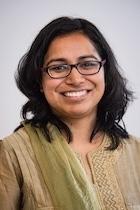Student Ambassadors
Speaking with a student ambassador is a great way to get a previous student’s perspective on the Language Schools experience.
If you would like to connect with a student ambassador to ask questions, please contact the School of Korean Assistant Director at schoolofkorean@middlebury.edu.

Conrad Chipman
Hometown: Alameda, CA
Program: 8-week Immersion
Level: 1, 4
Current: Georgetown Walsh School of Foreign Service
What surprised you about your experience at the Middlebury Language Schools?
The most surprising and gratifying aspect of the School of Korean is experiencing the rapid language gains. I never knew that I could see so much improvement in my Korean ability in such a short period of time.
Why did you choose to study at the Middlebury Language Schools?
While I was an undergraduate at Colgate University, I continuously sought out opportunities to pursue my interest in studying Korean. However, since Colgate does not currently offer a Korean language program, I decided to devote my college summers to intensive study. Thankfully, the Director of the KECK Language Center at Colgate University strongly encouraged me to attend the Middlebury School of Korean during the summer of my freshman year (2022). Following his recommendation, I enrolled as a Level 1 student.
Why did you choose to return to study at our School of Korean?
I decided to return to the School of Korean in summer 2025 for two main reasons. For one, I had a truly wonderful experience studying as a Level 1 student in 2022. Second, I received a language fellowship to study Korean.
Please describe how your language skills improved due to your studies at Middlebury.
My language skills have improved tremendously thanks to Middlebury. As a Level 1 student, I went from only being able to speak in rote phrases (novice) to being able to express my broader thoughts and feelings about my daily life (intermediate). As a Level 4 student, I went from being at a general conversational level to being able to share my opinions on more complex and nuanced social topics (advanced), which many people even struggle to discuss in their native languages (e.g. the pros and cons of AI development, the role of transgender athletes in competitive sports, etc).
Describe your typical day at the School of Korean.
General Schedule:
8:00 - 11:50 (A.M.): Korean Class (with 10 minute breaks every hour)
12:00 - 1:00: Lunch
1:00 - 3:15: Down Time
3:30 - 5:30: First Club! (optional) (e.g. literature, drama, drumming, cooking, sports)
6:00 - 7:00: Dinner
7:30 - 9:30: Second Club! (optional) (e.g. taekwondo, volunteering, calligraphy, dance)
Alternatively: if there is no club, there are optional events, such as movie nights, guest lectures, etc.
Personal Schedule:
I approached the summer with the mindset of maximizing the benefits of the program by pushing myself to do as much as possible (not something I necessarily recommend). That meant attending all optional clubs and events, arriving to the classroom 30 minutes before class every morning to go over material with my teacher, and using meal times to practice speaking as much as possible. Though this approach was quite taxing, the results in terms of my language proficiency gains were worthwhile.
What advice would you give someone wanting to attend the School of Korean?
To all the prospective School of Korean students reading this who are still on the fence about attending the program this summer, I encourage you to take that step out of your comfort zone and embark on a wonderful educational experience. If your true desire is to immerse yourself in and learn a new language, I think Middlebury is the best place to accomplish that goal.

William Kay
Hometown: Charleston, SC
Program: 8-week Immersion
Level: 1
Current: The Citadel, Education and Department of State Intern
What surprised you about your experience at the Middlebury Language Schools?
The passion of the faculty for the language they taught and their students. Also, the enduring relationships that I have maintained with my instructors over the years.
Why did you choose to study at the Middlebury Language Schools?
I studied at the language schools to help me meet language proficiency goals as my university only taught until the intermediate level.
Please describe how your language skills improved due to your studies at Middlebury.
My language skills improved immensely due to my studies at Middlebury. I came in with little knowledge and no experience in using the language. After 2 months I was able to comfortably engage with my professors and friends at meal times regarding a variety of topics.
What advice would you give someone wanting to attend the School of Korean?
If you put the work in you will make remarkable gains towards your personal goals for proficiency in your target language. Beyond that however, the relationships you build during your time at Middlebury can last a life time. People I met four and five years ago when I first went for Japanese have become some of my closest friends since. Those relationships have directly impacted the direction of my life. If I am able I will be going back to Middlebury a 4th time this coming summer to continue my study of the Korean language.

Roli Mahajan
Hometown: Lucknow, India
Program: 8-week Immersion
Level: 2
Current: Communications Consultant with International Organizations.
Why did you choose to study at our School of Korean?
I first learnt about Middlebury and the immersive language schools in 2023 through a post by a journalist on LinkedIn. The lady described this as a unique experience and recommended it to everyone who loves languages. I asked if I stood a chance and she encouraged me to apply. She told me that it would be an intense but invigorating experience.
Since my town doesn’t have a Korean school, I was able to start learning online during the pandemic. Even though I prefer in-person classes, this was a great start. My institute stopped offering my level online last year. I took this as a sign to challenge myself and move to the next level.
Add to that a bias that I have discovered; many language institutes are biased against older learners, telling me that younger students are a better “investment.” Thus, I do believe that Middlebury-language-school-kind-of-opportunity is hard to come by for working professionals, who often struggle to find the time and resources for language studies.
What surprised you about your experience at the School of Korean?
It was challenging, but it was so much fun. Everyone was striving to communicate better in a foreign language and it was difficult, we all would assume that the other person knew more and then we would all realize that there is so much more to learn, irrespective of how much we learnt. It was a community experience. Yes, it was about challenging oneself to learn more and learn better but surprisingly, I realized that I could learn so much better within a community. This was such a good mix of working together and then working on ourselves individually.
Please describe how your language skills improved due to your studies at Middlebury.
I’ve noticed that Korean words now pop into my head while I’m speaking English or Hindi. Reading short stories in Korean is also less intimidating than it was before Middlebury. I still have a long way to go, but the program gave me the motivation and a major boost that I needed to continue my journey as a language learner.
Describe a typical day at our School of Korean.
There was no typical day at the School of Korean :)
Every day was unique, different and fun. During my 8 weeks at the School, I looked forward to almost all days. On paper we would have classes from 8 to 12 and then lunch together with our school-mates so that we would practice the language. Then, we would run around to attend different club activities. We had around 10 clubs and most students were a part of at least 3 of them. You could make time for activities like swimming or tennis or one of the many sports facilities that Middlebury has to offer. This would be followed by group dinners and then assignment time. Group activities made language learning fun.
The clubs were fun and quite a few in number, so much so that at times one was just exhausted with all the activity. Yet, if one missed out on any of the activities then it was easy to experience FOMO (Fear of Missing Out).
It might sound strange, but I loved attending classes. I learnt about nuances of the culture and most importantly, the teachers believed in supporting us (students) in ways that go beyond text-book learning. They would use different methods to keep us engaged, learn complicated grammar points and work with the knowledge we had to expand it, slowly and steadily. I loved the fact that one of my teachers never touched the language book but covered all that we had to learn through lived experiences. The teachers encouraged us to experiment with the language.
What advice would you give someone wanting to attend the School of Korean?
At the beginning of the school we were told, “Use the experience to work on expanding your horizons. Other students might know more or less but this summer is about you and how you learn from others. Compete but compete with yourself!”
I have paraphrased what the professor had said during our welcome ceremony but this was the sanest piece of advice that I could have received. So, I will echo this sentiment. Participate, live and enjoy the learning experience because this is unique. Irrespective of your level, if you are open to new experiences, you will have learnt so much by the end of this immersive experience and this will be rewarding when you go back to your regular learning life post-immersion.
Language Pledge:
Language learning is a humbling experience. Even when you might know a lot about different fields of study, you will be restricted by your vocabulary. Yet this is what motivates you to learn more so that you can express better in the language of your choice. When in a regular school, you can speak in the language of your choice outside the class hours but when you have signed the language pledge, then for 8 weeks the language you are learning will be the only language that you will be able to use. It will be hard. It will be frustrating. But if you stick with it, then it will also be rewarding. If the language pledge was not in place this immersive experience would not be that immersive. For first level it can be exceptionally tough, but if you are opting for Middlebury, you can do it. Fighting!

Antonio Romano
Hometown: Ashley Falls, MA
Program: 8-week Immersion
Level: 2
Current: English Instructor at Chungdahm English Academy
What surprised you about your experience at the Middlebury Language Schools?
I was surprised how much I was actually able to learn in the span of just 8 weeks. It feels like a short amount of time relative to the years of effort it takes to learn a language, but I felt as if I got a year’s worth of study done in that short summer.
Please describe how your language skills improved due to your studies at Middlebury.
My language skills improved immensely because I was able to use it day in and day out. I feel I especially improved when I spent time talking to higher level students or teachers, and still to this day remember phrases they taught me at mealtimes. I’m currently using Korean every day because I ended up moving to Korea for work. It has made adjusting to life here much easier.
What else?
I’d like for people to know that Middlebury is truly an experience where you get out as much as you’re willing to put into it. You can achieve so much not only in terms of language skills, but the personal growth from completing a rigorous program like Middlebury is also important. It’s also an opportunity to create long term friendships that continue even after Middlebury finishes.
Paige Roussell
Hometown: Burlington, VT
Program: 8-week Immersion
Level: 1,2
Current: University of Vermont, B.A. in Linguistics
What surprised you about your experience at the Middlebury Language Schools?
The thing that surprised me the most about Middlebury was how much fun I had and the number of connections that I made. I never would have expected to look back on the summer so fondly.
Why did you choose to study at the Middlebury Language Schools?
The reason I applied to Middlebury Language Schools was because I had been doing Korean self-study for multiple years with practically nothing to show for it (mainly because I lacked the time to study). So I wanted to do a program where I could completely focus on my language study.
Please describe how your language skills improved due to your studies at Middlebury.
For me I felt like I really made huge improvements in my Korean ability, especially speaking. Before the program all I could really do was read the alphabet without any concept of the meaning of what I was reading or how the grammar operates. By the end of the program I felt really comfortable with what I had learned during the program and could hold full conversations with my friends just in Korean. I was amazed because after so long of not making any progress on my own, I finally felt like I had actually learned something.
Is there anything else that you would like to let a student know about your experience?
This is something a supervisor of mine, who also attended Middlebury Language Schools, had told me before I attended: The program can be really difficult at times. I am not saying this to mean you shouldn’t attend Middlebury because it’s too hard, in fact, it’s the opposite. It’s an amazing opportunity and experience if you can go. That said, it is still an intensive and immersive learning environment in a language. You need to be prepared to struggle, especially if you are going in as a beginner since you may not be able to say much or understand the people around you for at least the first week.
There were times where I felt like I was the only one not making any progress. But in those situations it’s important to remember that as long as you are engaging with the opportunities and people around you, you are progressing. Even if it doesn’t feel like it. Language learning is not a straight line up, there are ebbs and flows. So it’s okay to feel like you are plateauing or making a lot of mistakes, it’s all part of your growth!
Describe a typical day at the School of Korean.
7:00-7:30 : Wake up, get breakfast if early enough
8:00 - 12:00 : Class (with 10 breaks every hour)
~12:00 - 1:00 : Lunch with the School of Korean (Best time to practice what you just learned that day)
1:00 - 3:00 : Decompress at my dorm or study
~3:00 - 5:00 : Potential extracurricular (if none then I usually played games in Korean or watched K-dramas until dinner)
6:00 - 7:00 : Dinner with the School of Korean
~7:00 - 9:00 : Potential extracurricular (presentation/movie/club)
9:00 - 12:00 : Study/Daily homework/Decompress
~12:00 : Sleep!

Alex Shykov
Hometown: San Francisco, CA
Program: 8-week Immersion
Level: 2,4
Current: IDA - Research Associate
Why did you choose to study at the Middlebury Language Schools?
I picked Middlebury for two reasons: first, Fletcher classmate (Norva Hall) vouched for the program; second, the Language Pledge. Through past language learning experiences, I know that mastering a language takes full immersion, so I was excited to experience it with Middlebury.
What surprised you about your experience at the Middlebury Language Schools?
I started learning Korean at a Korean university in Seoul. It was challenging to speak Korean, so English became a default. Naturally, I was pleasantly surprised that on a daily basis, I used more Korean with Middlebury than I did in Seoul.
Please describe how your language skills improved due to your studies at Middlebury.
Practice makes better – perfection is too high of a bar. By practicing Korean essentially 24/7, inside and outside of the classroom, my Korean speaking and writing improved drastically. I fully realized it during an OPI when I wanted to continue talking to my interviewer, and I, to my surprise, didn’t run out of things to say.
What advice would you give someone wanting to attend the School of Korean?
Don’t fight the pledge – embrace it. It will be tough, of course. But that’s what will take you to the next level. Plus, get to know all instructors, assistants, and students – they are all there to help you.
